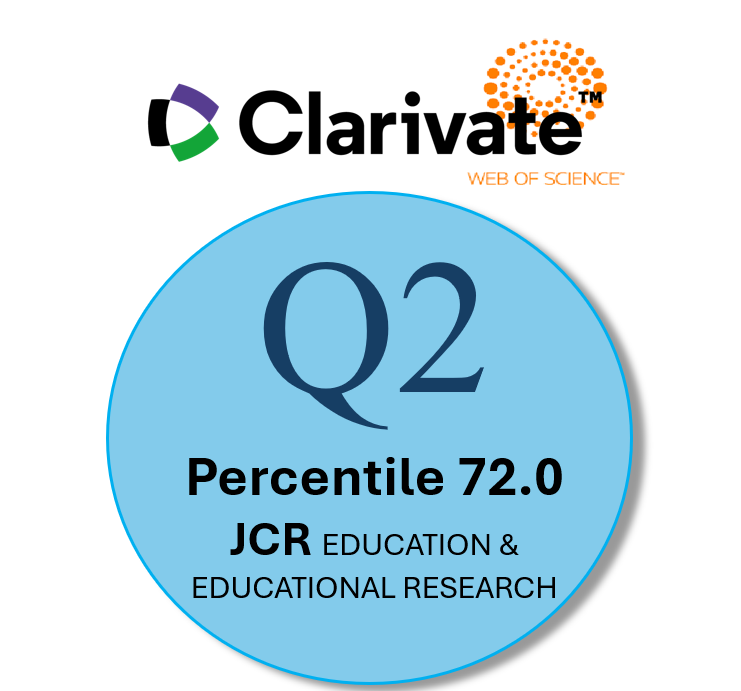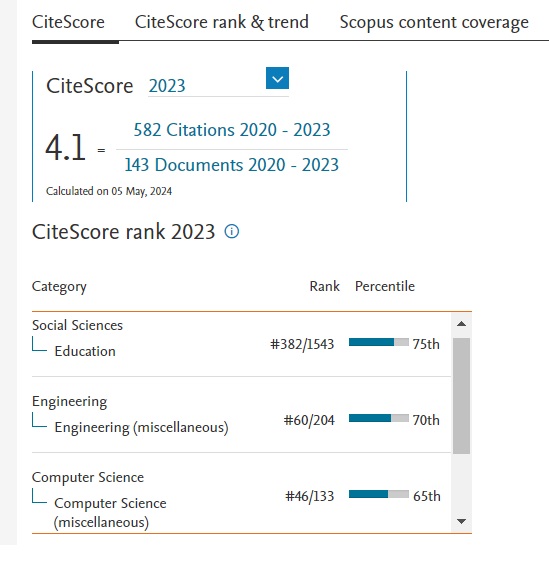La autorregulación del aprendizaje desde un enfoque de feedback entre pares: perspectivas de la IA generativa
Resumen
Esta investigación presenta cómo a partir de la adopción de estrategias de autorregulación utilizando el feedback entre pares y los chatbots se promueve la transformación de la evaluación en línea. Se describe la evaluación del diseño de una actividad de aprendizaje que integra una intervención de feedback entre pares para sugerir mejoras en la elaboración de ensayos académicos. A partir de un enfoque de investigación basado en el diseño se establecen tres fases principales, una primera de diseño de la propuesta y dos implementaciones consecutivas. En la primera se distribuyó un cuestionario de satisfacción a 348 estudiantes y el análisis de las respuestas se utilizó para el rediseño de la propuesta. En la segunda implementación, se utilizó un cuestionario con 24 estudiantes y una entrevista grupal al profesorado. Los resultados permitieron valorar positivamente la relación entre el feedback por pares, y el desarrollo de las competencias de autorregulación y de aprender a aprender. Finalmente, se concluye que es necesario proponer más a menudo estrategias de este tipo y que incluyan además el uso de la IA, dando así más oportunidades al estudiantado en el desarrollo de su autonomía y una gestión consciente y eficiente de su proceso aprendizaje, por lo que en este artículo se presenta también una propuesta de diseño para una nueva iteración con IA.
Descargas
-
Resumen1934
-
PDF1390
Citas
Atkinson, C. F. (2023). Cheap, quick, and rigorous: Artificial Intelligence and the systematic literature review. Social Science Computer Review. https://doi.org/10.1177/08944393231196281
Bailey, S. (2017). Academic Writing: A Handbook for International Students (5th ed.). Routledge. https://doi.org/10.4324/9781315169996
Bauer, E., Greisel, M., Kuznetsov, I., Berndt, M., Kollar, I., Dresel, M., Fischer, M. R., & Fischer, F. (2023). Using natural language processing to support peer‐feedback in the age of artificial intelligence: A cross‐disciplinary framework and a research agenda. British Journal of Educational Technology, 54(5), 1222–1245. https://doi.org/10.1111/bjet.13336
Boekaerts, M., & Corno, L. (2005). Self-Regulation in the Classroom: A Perspective on Assessment and Intervention. Applied Psychology: An International Review, 54(2), 199–231. https://doi.org/10.1111/j.1464-0597.2005.00205.x
Cano García, E. (2014). Análisis de las investigaciones sobre feedback: aportes para la mejora en el marco del EEES. Bordón. Revista De Pedagogía, 66(4), 9–24. https://recyt.fecyt.es/index.php/BORDON/article/view/Bordon.2014.66402
Carless, D. (2019). Feedback loops and the longer-term: towards feedback spirals. Assessment and Evaluation in Higher Education, 44(5), 705-714. https://doi.org/10.1080/02602938.2018.1531108
Carless, D. & Boud, D. (2018). The development of student feedback literacy: enabling uptake of feedback. Assessment & Evaluation in Higher Education, 43(8), 1315-1325. https://doi.org/10.1080/02602938.2018.1463354
Chauncey, S. A., & McKenna, H. P. (2023). A framework and exemplars for ethical and responsible use of AI Chatbot technology to support teaching and learning. Computers & Education: Artificial Intelligence, 5, 100182. https://doi.org/10.1016/j.caeai.2023.100182
Darvishi, A., Khosravi, H., Sadiq, S., & Gašević, D. (2022). Incorporating AI and learning analytics to build trustworthy peer assessment systems. British Journal of Educational Technology, 53(4), 844–875. https://doi.org/10.1111/bjet.13233
Davis, J. & Liss, R. (2006). Effective academic writing 3: The essay (2nd. ed.). Oxford University Press.
Double, K. S., McGrane, J. A., & Hopfenbeck, T. N. (2020). The impact of peer assessment on academic performance: A meta-analysis of control group studies. Educational Psychology Review, 32, 481-509. https://doi.org/10.1007/s10648-019-09510-3
Dunn, K. E., Lo, W. J., Mulvenon, S. W. & Sutcliffe, R. (2012). Revisiting the motivated strategies for learning questionnaire: a theoretical and statistical reevaluation of metacognitive self-regulation and effort regulation subscales. Educational and Psychological Measurement, 72 (2), 312-331. https://doi.org/10.1177/0013164411413461
Er, E., Dimitriadis, Y., & Gašević, D. (2021). A collaborative learning approach to dialogic peer feedback: a theoretical framework. Assessment & Evaluation in Higher Education, 46(4), 586-600. https://doi.org/10.1080/02602938.2020.1786497
Escalante, J., Pack, A. & Barrett, A. (2023). AI-generated feedback on writing: insights into efficacy and ENL student preference. Int J Educ Technol High Educ 20 (57). https://doi.org/10.1186/s41239-023-00425-2
Euler, D. (2017). Design principles as bridge between scientific knowledge production and practice design. EDeR. Educational Design Research, 1(1), 1-15. https://doi.org/10.15460/eder.1.1.1024
Fernádez-Ferrer, M. (2023). Retos y pistas para el uso de chatbots en educación. En Fernández-Ferrer, M. (Ed.), Chatbots en educación: tendencias actuales y desafíos futuros (pp. 144-154). LMI.
Graham, S., Harris, K. R., MacArthur, C., & Santangelo, T. (2017). Self-regulation and writing. In D. H. Schunk & J. A. Greene (Eds.), Handbook of self-regulation of learning and performance (pp. 138-152). Routledge. https://doi.org/10.4324/9781315697048-9
Guba, E., & Lincoln, Y. (1994). Competing Paradigms in Qualitative Research. In N. Denzin & Y. Lincoln (Eds.), Handbook of Qualitative Research (pp. 105-117). SAGE
Hadwin, A. F., Winnem P. H., y Nesbit, J. C. (2005). Roles for software technologies in advancing research and theory in educational psychology. British Journal of Educational Psychology, 75, 1-24. https://doi.org/10.1348/000709904x19263
Han, Y., & Xu, Y. (2020). The development of student feedback literacy: the influences of teacher feedback on peer feedback. Assessment & Evaluation in Higher Education, 45(5), 680-696. https://doi.org/10.1080/02602938.2019.1689545
Harindranathan, P., y Folkestad, J. (2019). Learning analytics to inform the learning design: Supporting instructor’s inquiry into student learning in unsupervised technology-enhanced platforms. Online Learning, 23(3), 34-55. https://doi.org/10.24059/olj.v23i3.2057
Hattie, J. & Timperley, H. (2007). The Power of Feed Back. Review of Educational Research, 77 (1), (81-112). https://doi.org/10.3102/003465430298487
Hew, K. F., Huang, W., Du, J., & Jia, C. (2023). Using chatbots to support student goal setting and social presence in fully online activities: learner engagement and perceptions. Journal of Computing in Higher Education, 35(1), 40-68. https://doi.org/10.1007/s12528-022-09338-x
Huh, Y. & Reigeluth, C. M. (2016). Designing instruction for self-regulated learning. In C.M. Reigeluth, B.J. Beatty & R.D. Myers (Eds.), Instructional-Design theories and models (Vo. IV): The Learner-Centered Paradigm of Education (pp. 243-267). Routledge. https://doi.org/10.4324/9781315795478
Järvelä, S., Hadwin, A., Malmberg, J., & Miller, M. (2018). Contemporary perspectives of regulated learning in collaboration. En F. Fischer, C.E. Hmelo-Silver, S.R. Goldman, P. Reimann (Eds.), International handbook of the learning sciences (pp. 127-136). Routledge. https://doi.org/10.4324/9781315617572
Kerman, N. T., Noroozi, O., Banihashem, S. K., Karami, M., & Biemans, H. J. (2022). Online peer feedback patterns of success and failure in argumentative essay writing. Interactive Learning Environments, 1-13. https://doi.org/10.1080/10494820.2022.2093914
Kuhail, M. A., Alturki, N., Alramlawi, S., & Alhejori, K. (2020). Interacting with educational chatbots: A systematic review. Education and Information Technologies, 28(1), 973-1018. https://doi.org/10.1080/15391523.2020.1767525
Latifi, S., Noroozi, O., Hatami, J., & Biemans, H. J. (2021). How does online peer feedback improve argumentative essay writing and learning?. Innovations in Education and Teaching International, 58(2), 195-206. https://doi.org/10.1080/14703297.2019.1687005
Le Hebel, F. et al. (2018). Students’ Perspectives on Peer Assessment. En J. Dolin & R. Evans (Eds.), Transforming Assessment (pp. 141-173). Springer, Cham. https://doi.org/10.1007/978-3-319-63248-3_6
Lodge, J.M., Panadero, E., Broadbent, J. & De Barba, P.G. (2019). Supporting self-regulated learning with learning analytics. En J. Lodge, J. Horvath & L. Corrin, (Eds.). Learning analytics in the classroom (pp. 45-55). Routledge. https://doi.org/10.4324/9781351113038
Lluch, L. & Cabrera, N. (2023). Autorregulación y evaluación entre iguales: un binomio necesario. En Lluch L. y Cabrera N. (Eds). Competencia de aprender a aprender y autorregulación en la universidad (pp. 15-39). Octaedro-IDP/ICE.
Malik, A. R., Pratiwi, Y., Andajani, K., Numertayasa, I. W., Suharti, S., Darwis, A., & Marzuki, M. (2023). Exploring Artificial Intelligence in Academic Essay: Higher Education Student’s perspective. International Journal of Educational Research Open, 5, 100296. https://doi.org/10.1016/j.ijedro.2023.100296
Nicol, D. J., & Macfarlane-Dick, D. (2006). Formative assessment and self-regulated learning: a model and seven principles of good feedback practice. Studies in Higher Education, 31(2), 199-218. https://doi.org/10.1080/03075070600572090
Okonkwo, C. W., y Ade-Ibijola, A. (2021). Chatbots applications in education: A systematic review. Computers and Education: Artificial Intelligence, 2, 100033. https://doi.org/10.1016/j.caeai.2021.100033
Panadero, E., Jonsson, A. & Botella, J. (2017). Effects of self-assessment on self-regulated learning and self-efficacy: four meta-analyses. Education Research Review, 22, 74-98. https://doi.org/10.1016/j.edurev.2017.08.004
Pintrich, P.R. (2000). The role of goal orientation in self-regulated learning. En M. Boekaerts, P.R. Pintrich & M. Zeidner (Eds.), Handbook of self-regulation (pp. 451-502). Academic Press. https://doi.org/10.1016/B978-0-12-109890-2.X5027-6
Reeves, T.C. (2006). Design research from a technology perspective. In J. van den Akker, K. Gravemeijer, S.McKenney & N. Nieveen (Eds.), Educational design research (pp. 52-66). Routledge. https://doi.org/10.4324/9780203088364
Reimann, P. (2013). Design-based research—Designing as research. En R. Luckin, S. Puntambekar, P. Goodyear, B.L. Grabowski, J. Underwood, & N. Winters (Eds.), Handbook of Design in Educational Technology (pp. 44-52). Routledge. https://doi.org/10.4324/9780203075227
Ros, M. Z. (2018). La universidad inteligente: La transición de los LMS a los Sistemas Inteligentes de Aprendizaje en Educación Superior. RED. Revista De Educación a Distancia, 57. https://doi.org/10.6018/red/57/10
Ruiz Martin, H. (2020). Conoce tu cerebro para aprender a aprender. ISTF
Salvagno, M., Taccone, F.S. & Gerli, A.G. (2023). Can artificial intelligence help for scientific writing? Critical Care 27 (75). https://doi.org/10.1186/s13054-023-04380-2
Sandin, M. P. (2003). Investigación cualitativa en Educación. Fundamentos y tradiciones. Madrid: Mc Graw Hill.
Song, D., & Kim, D. (2021). Effects of self-regulation scaffolding on online participation and learning outcomes. Journal of Research on Technology in Education, 53(3), 249-263. https://doi.org/10.1080/15391523.2020.1767525
Tai, J., Adachi, C. (2020). The future of Self and Peer Assessment: Are technology or people the key? In M. Bearman, P. Dawson, R. Ajjawi, J. Tai, & D. Boud (Eds.), Re-imagining university assessment in a digital world (pp. 213-227). Springer, Cham. https://doi.org/10.1007/978-3-030-41956-1_15
Wang, F., & Hannafin, M. J. (2005). Design-based research and technology-enhanced learning environments. Educational technology research and development, 53(4), 5-23. https://doi.org/10.1007/BF02504682
Winkler, R., y Söllner, M. (2018). Unleashing the potential of chatbots in education: A state-of-the-art analysis. En Academy of Management Annual Meeting (AOM). https://www.alexandria.unisg.ch/publications/254848
Winne, P. H., & Hadwin, A. F. (2008). The weave of motivation and self-regulated learning. En D. H. Schunk & B. J. Zimmerman (Eds.), Motivation and self-regulated learning: Theory, research, and applications (pp. 297–314). Lawrence Erlbaum Associates Publishers. https://doi.org/10.4324/9780203831076
Winstone, N., & Carless, D. (2019). Designing effective feedback processes in higher education: A learning-focused approach. Routledge. https://doi.org/10.4324/9781351115940
Zahour, O., El Habib Benlahmar, A. E., Ouchra, H., y Hourrane, O. (2020). Towards a Chatbot for educational and vocational guidance in Morocco: Chatbot E-Orientation. International Journal of Advanced Trends in Computer Science and Engineering, 9(2), 2479-2487. http://dx.doi.org/10.30534/ijatcse/2020/237922020
Zimmerman, B. J. (1986). Becoming a self-regulated learner: Which are the key subprocesses? Contemporary Educational Psychology, 11(4), 307–313. https://doi.org/10.1016/0361-476X(86)90027-5
Zimmerman, B. J. (2000). Attaining self-regulation: A social cognitive perspective. En M. Boekaerts, P. R. Pintrich, & M. Zeidner (Eds.), Handbook of self-regulation (pp. 13–39). Academic Press. ht
Derechos de autor 2024 Revista de Educación a Distancia (RED)

Esta obra está bajo una licencia internacional Creative Commons Atribución-NoComercial 4.0.
Las obras que se publican en esta revista están sujetas a los siguientes términos:
1. El Servicio de Publicaciones de la Universidad de Murcia (la editorial) conserva los derechos patrimoniales (copyright) de las obras publicadas, y favorece y permite la reutilización de las mismas bajo la licencia de uso indicada en el punto 2.
2. Las obras se publican en la edición electrónica de la revista bajo una licencia Creative Commons Reconocimiento-NoComercial-SinObraDerivada 3.0 España (texto legal). Se pueden copiar, usar, difundir, transmitir y exponer públicamente, siempre que: i) se cite la autoría y la fuente original de su publicación (revista, editorial y URL de la obra); ii) no se usen para fines comerciales; iii) se mencione la existencia y especificaciones de esta licencia de uso.
3. Condiciones de auto-archivo. Se permite y se anima a los autores a difundir electrónicamente las versiones pre-print (versión antes de ser evaluada) y/o post-print (versión evaluada y aceptada para su publicación) de sus obras antes de su publicación, ya que favorece su circulación y difusión más temprana y con ello un posible aumento en su citación y alcance entre la comunidad académica. Color RoMEO: verde.














